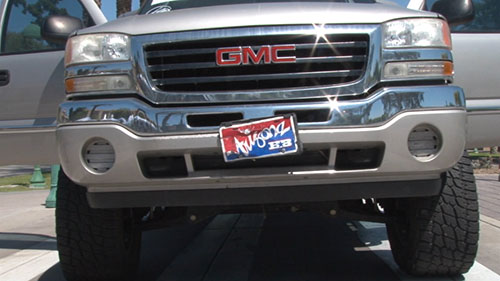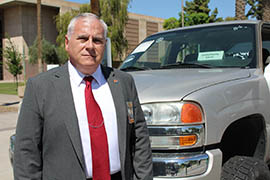Cronkite News has moved to a new home at cronkitenews.azpbs.org. Use this site to search archives from 2011 to May 2015. You can search the new site for current stories.
Auto theft less of a problem in Arizona, but don’t rest easy
Editor’s Note: A previous version of this story erroneously reported the year that Arizona had the nation's worst rate of automobile theft.
In 2003, Arizona had the highest rate among states for automobile thefts. As of 2013, its rank had improved to 10th worst, according to the Arizona Automobile Theft Authority.
That doesn’t mean there isn’t still a problem, said Frederick Zumbo, executive director of Arizona Automobile Theft Authority, even though total thefts declined from 56,997 in 2003 to 17,438 in 2013. In fact, he said, a car stolen from the Valley can be at the Mexican border in about two hours and torn up to be used for trafficking drugs or people.
As Zumbo’s group and law enforcement partners held Auto Theft and Crime Prevention Day at the State Capitol on Tuesday, recovered pickup truck with the back seats were ripped out illustrated the continuing problem.
“We are a car-driven society,” Zumbo said. “So when a vehicle like this gets stolen, and is recovered in the condition that it is, it’s not driveable … It’s very disappointing to people and they feel violated.”
Zumbo said a good car thief can break into a car in three minutes. In response, law enforcement agencies use technology such as license plate readers to find and recover vehicles.
Paul Babeu, Pinal County’s sheriff and a member of the Arizona Auto Theft Authority board, said it’s essential to discuss crimes and auto theft with policymakers.
“We can do so much more in partnerships with our local police departments, sheriff offices and DPS working together to disrupt and dismantle some of these criminal syndicates,” he said.
Tina Balsewicz, a Chandler Police Department crime prevention officer, said 95 percent of a police officer’s job is educating the public, not arresting people.
“Education is power, that’s what it comes down to,” she said. “We’re giving them an opportunity to defend themselves.”
Find out why @AngelieMeehan interviewed @ChandlerPolice today for @cronkitenews. Coming soon. #CNaz pic.twitter.com/tnHaoObFri
— Samantha Incorvaia (@_SamI520) March 31, 2015









